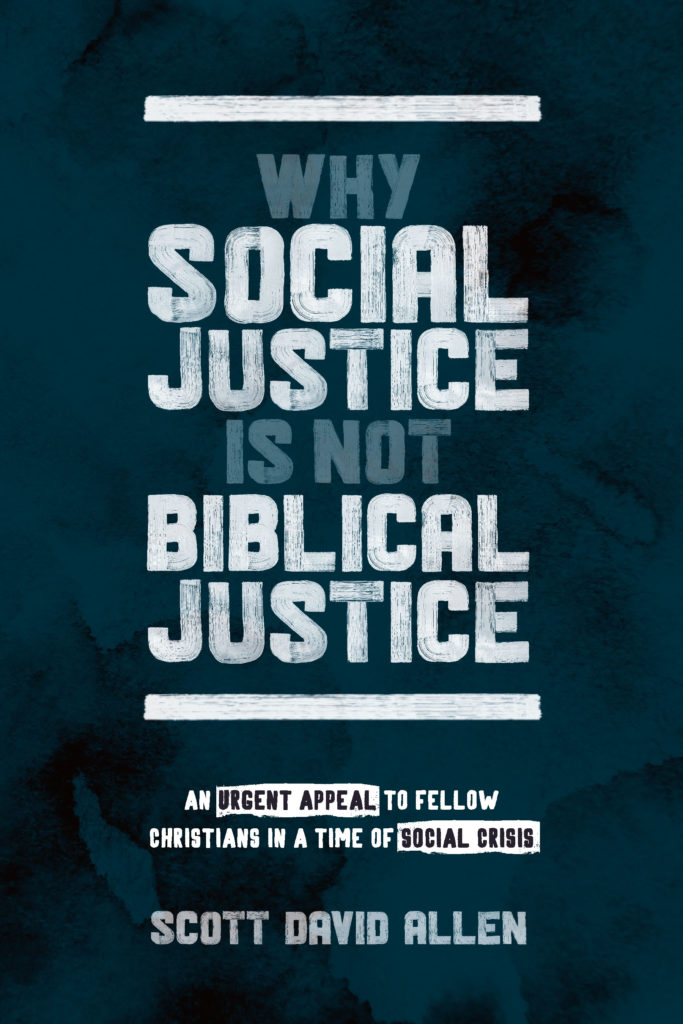I’m grateful to Tim Challies for taking time to review Why Social Justice is Not Biblical Justice. Tim is a popular evangelical writer, blogger and book reviewer. He serves on the pastoral team at Grace Fellowship Church in Toronto, Ontario.
Here’s an excerpt from Tim’s review. You can read the whole thing here.
After showing how ideological social justice has begun to make inroads into the church—through means such as “Progressive Christianity,” egalitarianism, the LGBTQ movement, and Woke Church—[Scott] makes a surprising turn and offers an appreciative critique of the Statement on Social Justice and the Gospel which, though primarily associated with John MacArthur, was actually penned and signed by a group of individuals. While he lauds much of its intent and content, he laments that it “unfortunately repeats the same error of the earlier fundamentalist movement. Rather than reasserting the rich legacy of biblical social engagement, the statement drifts into the old sacred-secular dichotomy that pits gospel proclamation against social ministry.” Just as fundamentalism was defined more by what it was against than what it is for, he fears the same may be true for those of us who are concerned about the move toward social justice. “The crying need today, as it was in the early twentieth century, is to recover a biblical, orthodox approach to justice and cultural engagement. At the same time, we must speak out against unbiblical social justice ideology. We need to rediscover and champion a deeply biblical approach to cultural engagement, in ways that lead to greater justice and human flourishing, and not to abandon these things as a distraction from our ‘core mission.’”
This, then, leads to the book’s Schaefferean call for the church to regain a comprehensive biblical worldview that will not only spurn ideological social justice but also emphasize true justice through cultural engagement and transformation. “Let’s not simply be anti-ideological social justice. Let’s be probiblical worldview.” This requires faithfully preaching the gospel but then also calling Christians into faithfully engaging the culture. “The temptation by opponents of ideological social justice to overreact by pitting evangelism and gospel proclamation against cultural engagement is a grievous error that must be avoided.” Thus we must, as did so many of our forebears, fight for justice in this world and defend the victims of injustice. But always we must be careful that we do so according to a biblical, wholistic definition of “justice.”
Will social justice prove to be a fearsome foe? Will it prove to be the dominant challenge to orthodox Christianity in the twenty-first century? Only time will tell. In the meantime, we will be well served with books that help us sharpen our understanding of true justice and help us combat any counterfeits. Scott David Allen’s Why Social Justice Is Not Biblical Justice is among the first book-length responses and it is one that makes a valuable contribution. Its strength is not just in calling people away from unbiblical notions of justice, but in calling people toward a fully-formed worldview in which Christians care more for justice—true justice—than anyone else. “This is my plea,” he says. “Recognize and reject the counterfeit.
Remember what true justice is. Hold fast to that truth, no matter how unpopular. Speak it out. Demonstrate it. Be the salt and light Jesus commands us to be.” To that I give a hearty “Amen!”





As I read this book the only thing I could recall was the response of Dr. E.V. Hill was once asked if he thought Jesus was Caucasian as depicted in paintings. He replied, “I don’t know anything about a white Jesus… I know about Christ, a Savior named Jesus. I don’t know what color He is. He was born in the brown Middle East; He fled to black Africa; and He was in heaven before the gospel got to white Europe. So, I don’t know what color He is.” He went on to say, “I do know one thing: if you bow at the altar with color on your mind, you’ll get up with color on your mind. Go back again – and keep going back until you no longer look at His color, but at His greatness and His power – His power to save!”
While I am not aware of your age or background, I know when Bob Jones University made black students sign statements about dating white females, and attended Bible Colleges where instructors taught the curse of “Ham” being his turned black, as well as felt the sting of comments, both black and white, living the first 10 years of my life with it being a crime for my parents to be married in half the country.
Certainly, your definition of biblical justice bears some truth, but it does not address the boldness to speak out. Sadly, as I have seen to many times, individuals in your position pontificate well, until it is your family member of close friend that finds themselves addressing injustice.
While I appreciate you citation concerning Dr. Kings letter from the Birmingham jail, you ironically failed to address his message to the white clergy and church who were missing from declaring “biblical justice”. Unfortunately, the only 2 instances that have riled many white Christians was when they say the assault in 1965 on the Edmund Pettus Bridge of church folks marching for the right to vote and the death of George Floyd by a police officer over an alleged phony $20 dollar bill, ironically “Imago Dei” did not apply when valuing his life.
I am grateful you have not ever had to have your daughter call on Bible Class night after you just sat down at home to say they were being attacked in the car as they were leaving out of the parking lot of a high school basketball game. So when you tell them to hang up and call the police you are on your way, she shares its the police attacking them. Nor have you had to turn heads when you find a group of white males in a training department believing it is funny that the only way certain women pass is to have sex with them. Then again, why would you feel the shooting of Micheal Brown in Ferguson was unjust, given you were not called to the scene, waiting 4 hours with the department of justice for them to bring his mother out of the complex through the rioting to meet with you to discuss the incident. And given I knew the Chief of Police and the facts of what occurred which good folks don’t want to hear I am saddened to see how you abuse the platform God provided you with to encourage that the Sunday 10 am time remain the most segregated hour in U.S.
I don’t know your heart and you write that you truly desire to see logs, but your writing reflects that you refuse to go outside of the circles to see what is true.
I do apologize but given the racial strife occurring today, where individuals only want to see what makes them comfortable I can only pray that God would allow some others to experience the vision Peter say in Acts 10 and understand that everything He made was good!
Rev. Ford,
Thank you so much for taking the time to write and share your thoughts about my book, Why Social Justice is Not Biblical Justice. I would like to underscore and strongly affirm your quote from Dr. E.V. Hill:
“If you bow at the altar with color on your mind, you’ll get up with color on your mind. Go back again – and keep going back until you no longer look at His color, but at His greatness and His power – His power to save!”
To that, I say a hearty Amen!
You ended on a similar note by citing Acts 10, and the story of Peter and Cornelius. In verses 34-35, Peter says: “I now realize how true it is that God does not show favoritism, but accepts from every nation the one who fears him and does what is right.”
I understand this to mean that we should treat people without partiality—as human beings, precious image-bearers of God, regardless of their skin color or ethnicity. I believe this same view was articulated by Dr. King who famously dreamed of an America where his children would be judged by the content of their character not the color of their skin.
This is something I believe in with all my heart, and have sought to live out all my life. It is a cornerstone of our teaching at the Disciple Nations Alliance. This is why I too view the former racial policies of Bob Jones University to be abhorrent and unbiblical.
The reason I’m deeply concerned about today’s contemporary social justice movement is that it repudiates these powerful, biblical ideas. I’m sure you are aware that today, the very notion of “colorblind” is viewed as hateful and oppressive by many advocates of social justice. Instead, groups like Black Lives Matter promote a kind of racial essentialism. They elevate skin color to the pinnacle of human identity. All that is important about you can be known by your skin color, with judgments made on that basis alone. Unlike the Civil Rights movement of the 1950s, today’s social Justice ideology isn’t about healing racial divisions but exacerbating them, which is exactly what is happening in America as this ideology expands.
Regarding Dr. King’s famous Letter from Birmingham Jail, including the part you specifically highlight, I have written on this before. You can see that here. http://darrowmillerandfriends.com/2014/01/20/church-listening-martin-luther/
I believe you misunderstand me Rev. Ford. You state that I’m using my platform to further racial segregation. Nothing could be further from the truth. I hate racism with a deep and enduring passion, which is why I have such a strong, visceral reaction to critical race theory, or any other form of racist ideology.